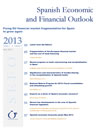Fixing EU financial market fragmentation for Spain to grow again
Fecha: 2013
Spanish and International Economic & Financial Outlook, SEFO, V. 2 N.º 3
Sumario
[expand title= "Fragmentation of the European financial market and the cost of bank financing "]The impact of the crisis has halted the process of interest rate convergence, which had been taking place following the creation of the European Monetary Union (EMU), and ushered in a new period in which the interest rate differences between countries have widened. This trend has been exacerbated further in distressed countries after the sovereign debt crisis broke out, and in particular in the case of borrowing costs for SMEs. Currently, the cost of financing for SMEs in distressed countries is twice that in other countries, with Spanish SMEs paying 35% and 77% above Euro area and German SMEs, respectively. Deposit rate convergence has also been reversed, as banks’ reliance on retail deposits for funding has driven up financing costs, again particularly for the distressed countries. These higher costs, ultimately passed on to consumers, are adding an additional drag on growth. Examining the case of Spain, we can clearly observe the additional burden of this market fragmentation on businesses and households. In this context, a genuine banking union is the only way to reduce the huge differences currently existing between the borrowing costs paid in different countries of the Euro area.
- Leer más
Over the period from March to May 2013, Spain has taken key actions in several areas as stipulated by the MoU with the EU, including: i) the restructuring and recapitalization of nationalized banks, complete with burden-sharing mechanisms for Group 1 and Group 2 banks; ii) the establishment of guidelines for reclassification of loans; and, iii) the approval of an updated business plan for the SAREB, which aims at selling almost half of the assets transferred by banks in 5 years. As for the burden-sharing mechanisms, the Steering Committee of the FROB has approved haircuts on preferred stock and subordinated debt of Group 1 and Group 2 banks with a range from 13% to 60%. In the case of loan reclassifications, the actions are expected to have potential impact on provisioning requirements, and as a consequence, credit conditions. The Bank of Spain has informed that there are 208.21 billion euros in refinanced and rescheduled loans and 45.7 billion euros correspond to doubtful loans, which are not covered by provisions. In the case of actions related to the SAREB, these will likely influence housing prices, banks’ real estate exposure, as well as their general balance sheet health. The success of the SAREB will be a large determinant of whether or not the government will be able to resolve the banking crisis overall.
- Leer más
One of Spain’s commitments under the MoU signed with the EU for aid to the financial sector was to carry out a so-called burden-sharing exercise. Current estimates for the impact of the exercise point to a private sector contribution of nearly 13 billion euros, i.e., one fourth of the capital needs identified in the stress test performed under the MoU. Aside from its large scale, the process is also unique and technically complex, as a good deal of the affected hybrid instruments were placed among the retail customers of the institutions which need assistance. The FROB has set up burden-sharing guidelines for Group 1 and Group 2 banks. The ultimate impact of these measures on the nominal value of instruments for the holders of the securities in question will presumably be even greater than the stipulated haircuts, due to the mechanisms for exchange put in place to recapitalize banking institutions and the price levels to be set for the shares of the banks that are, or will be listed.
- Leer más
The Spanish government unveiled, within the framework of the Stability and Growth Program for 2013-2016, the National Reform Program for the current year. The main policy lines were mostly already known, as they were included in the previous version or they had been announced beforehand. Delays in the implementation of some reforms, such as those related to rationalizing the public administration, and the need to further develop the details of other policies already in force, such as public pensions or labor reform, mean that the key elements of the 2013 Program are an extension of those from last year.
- Leer más
The Spanish export sector has registered positive performance throughout the years of the economic crisis. Nevertheless, the general perceptions of Spanish export performance in recent years may be overly optimistic. The orientation of many Spanish firms towards external markets in reaction to falling internal demand may be merely cyclical. At the same time, the relative weight of the export sector in the Spanish economy, although having increased during the crisis, is still below that of other countries. Finally, given the high proportion of imports in Spanish exports, the generation of value added remains modest. In previous crises, the export sector led the recovery, but on those occasions, devaluations were more intense and the external context more favourable, circumstances not present in the current environment.
- Leer más

